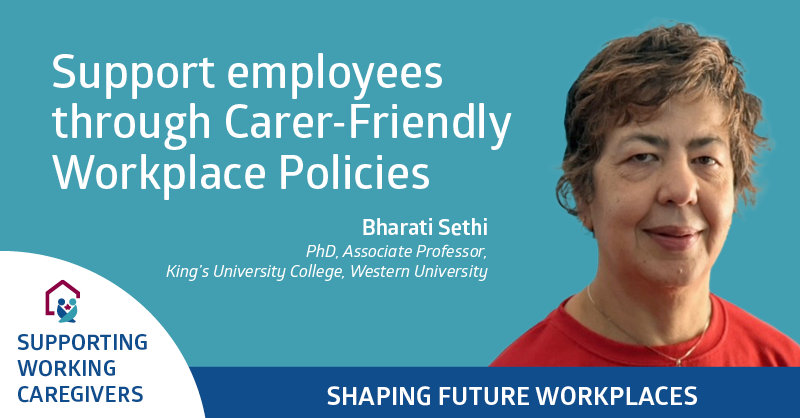Visible Minority Immigrants as Transnational Carer-Employees Amidst COVID-19
As part of the Healthy, Productive Work (HPW) Partnership Grant, this project is part of a larger five-year study on Transnational Caregiving that explores the experiences of Indigenous, visible minority, and European Carer-Employees (CEs) in London, Ontario.
The goal of this part of the larger study was to explore the transnational caregiving experiences of visible minority CEs pre-COVID-19 and during the pandemic.

Image by A.D.
In Canada, one in every five persons is a visible minority (19.1% of the total population), of which 65.1% are immigrants.[i] Many of these immigrants provide transnational care because of an increase in global mobility and due to the aging of the population worldwide.[ii] In London, Ontario, immigrants represent 21.2% of the city’s population, while visible minority immigrants represent 16% (of which 51% are female and 49% male)[iii].
Transnational Carer-Employees (TCE) are immigrants or Indigenous populations who reside and work in Canada while simultaneously providing care to parents, adults living with a disability, and children who live in their home country. Transnational caregiving may involve long-distance moral, emotional, and/or financial support. Additionally, some participants are the decision makers for their care recipients’ care, finances, and/or funeral rites.

Community-based participatory research[iv] and arts-based ethnographic methodologies were used to engage 29 participants in face-to-face or virtual interviews. Interviews were conducted in English, Spanish, and Arabic. Some participants were also asked to submit an art piece that represented their transnational caregiving experiences. Thematic analysis was used to analyze the interview data and artwork.
Thematic analysis revealed the following themes:
- Increased sense of responsibility for transnational-care due to COVID-19.
- Guilt over a decreased ability to provide financial assistance.
- Feelings of grief and gratitude.
- Increased anxiety over the economic, social and physical wellbeing of care recipients.
Additionally, while some participants referenced cultural gender norms as influencing their reasons for providing transnational care, others stated family values, birth order, and religion as additional or alternative factors. All participants were unaware of Carer-Friendly Workplace Policies (CFWPs).
Participants with stable employment had a greater ability to help financially, while those who were laid off had added stress and financial burden. Participants from certain countries of origin had unique worries for the safety of their families due to sociopolitical events, rather than due to the impact of COVID-19.
The findings from this research illuminate intersectional factors that emphasized the multiple roles of TCEs as employers, caregivers, partners, siblings, and providers, among other roles. The study highlights the need for workplace policies, such as CFWPs and health benefits, to support TCEs being able to manage paid work and transnational care in order that they can stay healthy and employed.[v]
Read the poster presentation
References
[i] Statistics Canada. (2013). Immigration and ethnocultural diversity in Canada. NHS Analytical Products, 2011, Statistics Canada catalogue no. 99-010-X. http://bit.ly/1gjVgiC
[ii] Sharma, A. (2014). Transnational caregiving: Family members in Canada caring across borders. Transition: The Vanier Institute of Family, 44(2), 13-14.
[iii] (MarTaggart et al., 2013; Statistics Canada, 2017). Links for this do not work Do you have an updated source?
[iv] Community-based participatory research is a collaborative approach that engages all stakeholders throughout the research process.
[v] Ireson, R., Sethi, B. & Williams, A. (2016). Availability of caregiver friendly workplace policies (CFWPs): An international scoping review. Health & Social Care in the Community, 1-14. doi: 10.1111/hsc.12347
ABOUT THE PROJECT
Carers Canada is leading the knowledge mobilization activities for a multi-sectorial research program to spread and scale a carer-friendly workplace standard, known as the Carer-Inclusive and Accommodating Organizations’ Standard (CSAB701-17). Led by Dr. Allison Williams, CIHR Research Chair in Gender, Work and Health at McMaster University, the research program consists of six inter-related sub-projects that will: increase awareness of the standard across Canada; evaluate readiness to change; determine feasibility and cost benefit; embrace cultural competency; consider Indigenous perspectives; and create an international standard. Visit PARTNERSHIP PROJECT SITE here

CIHR/SSHRC Healthy Productive Work Partnership Grant “Scaling up the Career Inclusive Accommodating Organizations Standard” FRN: HWP-146001 (CIHR); 890-2016-3018 (SSHRC).
 Bharati SethiFebruary 17, 2022
Bharati SethiFebruary 17, 2022

Visible Minority Immigrants as Transnational Carer-Employees Amidst COVID-19
As part of the Healthy, Productive Work (HPW) Partnership Grant, this project is part of a larger five-year study on Transnational Caregiving that explores the experiences of Indigenous, visible minority, and European Carer-Employees (CEs) in London, Ontario.
The goal of this part of the larger study was to explore the transnational caregiving experiences of visible minority CEs pre-COVID-19 and during the pandemic.

Image by A.D.
In Canada, one in every five persons is a visible minority (19.1% of the total population), of which 65.1% are immigrants.[i] Many of these immigrants provide transnational care because of an increase in global mobility and due to the aging of the population worldwide.[ii] In London, Ontario, immigrants represent 21.2% of the city’s population, while visible minority immigrants represent 16% (of which 51% are female and 49% male)[iii].
Transnational Carer-Employees (TCE) are immigrants or Indigenous populations who reside and work in Canada while simultaneously providing care to parents, adults living with a disability, and children who live in their home country. Transnational caregiving may involve long-distance moral, emotional, and/or financial support. Additionally, some participants are the decision makers for their care recipients’ care, finances, and/or funeral rites.

Community-based participatory research[iv] and arts-based ethnographic methodologies were used to engage 29 participants in face-to-face or virtual interviews. Interviews were conducted in English, Spanish, and Arabic. Some participants were also asked to submit an art piece that represented their transnational caregiving experiences. Thematic analysis was used to analyze the interview data and artwork.
Thematic analysis revealed the following themes:
- Increased sense of responsibility for transnational-care due to COVID-19.
- Guilt over a decreased ability to provide financial assistance.
- Feelings of grief and gratitude.
- Increased anxiety over the economic, social and physical wellbeing of care recipients.
Additionally, while some participants referenced cultural gender norms as influencing their reasons for providing transnational care, others stated family values, birth order, and religion as additional or alternative factors. All participants were unaware of Carer-Friendly Workplace Policies (CFWPs).
Participants with stable employment had a greater ability to help financially, while those who were laid off had added stress and financial burden. Participants from certain countries of origin had unique worries for the safety of their families due to sociopolitical events, rather than due to the impact of COVID-19.
The findings from this research illuminate intersectional factors that emphasized the multiple roles of TCEs as employers, caregivers, partners, siblings, and providers, among other roles. The study highlights the need for workplace policies, such as CFWPs and health benefits, to support TCEs being able to manage paid work and transnational care in order that they can stay healthy and employed.[v]
Read the poster presentation
References
[i] Statistics Canada. (2013). Immigration and ethnocultural diversity in Canada. NHS Analytical Products, 2011, Statistics Canada catalogue no. 99-010-X. http://bit.ly/1gjVgiC
[ii] Sharma, A. (2014). Transnational caregiving: Family members in Canada caring across borders. Transition: The Vanier Institute of Family, 44(2), 13-14.
[iii] (MarTaggart et al., 2013; Statistics Canada, 2017). Links for this do not work Do you have an updated source?
[iv] Community-based participatory research is a collaborative approach that engages all stakeholders throughout the research process.
[v] Ireson, R., Sethi, B. & Williams, A. (2016). Availability of caregiver friendly workplace policies (CFWPs): An international scoping review. Health & Social Care in the Community, 1-14. doi: 10.1111/hsc.12347
Bharati Sethi is an Associate Professor at the School of Social Work, King’s University College. She utilizes participatory and arts-based methods to highlight social determinants of health in immigrants’ lives and capture their relevance to social justice. She has contributed to 51 peer-reviewed publications, one edited book, and over 100 public presentations in the last ten years. Her research projects totalling 4.5 million dollars has earned her prestigious community and academic awards. She was interviewed by the Free Press, Sarnia and Lambton County, Globe and Mail, CBC, 980 CKNW, Toronto Star, and Conversations Canadian Press on her research with racialized personal support workers.
LinkedIn: @bharati-sethi-a9ab1949
ABOUT THE PROJECT
Carers Canada is leading the knowledge mobilization activities for a multi-sectorial research program to spread and scale a carer-friendly workplace standard, known as the Carer-Inclusive and Accommodating Organizations’ Standard (CSAB701-17). Led by Dr. Allison Williams, CIHR Research Chair in Gender, Work and Health at McMaster University, the research program consists of six inter-related sub-projects that will: increase awareness of the standard across Canada; evaluate readiness to change; determine feasibility and cost benefit; embrace cultural competency; consider Indigenous perspectives; and create an international standard. Visit PARTNERSHIP PROJECT SITE here

CIHR/SSHRC Healthy Productive Work Partnership Grant “Scaling up the Career Inclusive Accommodating Organizations Standard” FRN: HWP-146001 (CIHR); 890-2016-3018 (SSHRC).